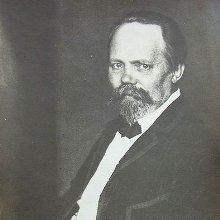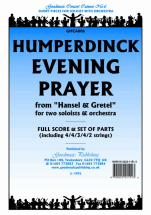Evening Prayer -from
Buy this item (in stock)
Product ID: GM1 CA006
By Engelbert Humperdinck
published: 1893
Publisher:
Goodmusic
Series:
Concert Cameos
Genre:
Romantic Era
Line Up:
Symphony Orchestra (Solo: Any)
Duration:
4:00
Set & Score
This item is in stock
About this item
This
well-known piece can be performed by orchestra with almost any suitable
solo instruments or voices (not necessarily the same; it could be
performed by, say, a trumpet and a french horn or many other
combinations).
*A leaflet-sized vocal copy of the ROBERTON edition (catalogue no.
75075) is included within the set of parts but the orchestral version
will be compatible with many other versions should your singers already
have a different one. There are various different translations
available so no lyrics are shown in the full score.
Instrumentation
2 Flutes, Oboe(s), 2 Clarinets in Bb, 2 Bassoons, 4 Horns in F Strings (Violin 1, Violin 2, Viola, Cello, Bass) 2 Solo voices or instruments (parts included for voice*, treble clef instrument in C, Bb, F or Eb, and bass clef instrument).
Reviews and rating
No review available, be the first to write one!

Composer
Engelbert Humperdinck (1854-1921)

Engelbert Humperdinck (1 September 1854 – 27 September 1921) was a German composer, best known for his opera, Hänsel und Gretel. Humperdinck was born at Siegburg in the Rhine Province; at the age of 67 he died in Neustrelitz, Mecklenburg-Western Pomerania.
After receiving piano lessons, Humperdinck produced his first composition at the age of seven. His first attempts at works for the stage were two Singspiele written when he was 13. His parents disapproved of his plans for a career in music and encouraged him to study architecture. Nevertheless, he began taking music classes under Ferdinand Hiller at the Cologne Conservatory in 1872. In 1876 he won a scholarship that enabled him to go to Munich, where he studied with Franz Lachner and later with Josef Rheinberger. In 1879 he won the first Mendelssohn Award given by the Mendelssohn Stiftung (foundation) in Berlin. He went to Italy and became acquainted with Richard Wagner in Naples. Wagner invited him to join him in Bayreuth and during 1880 and 1881 Humperdinck assisted in the production of Parsifal. He also served as music tutor to the composer's son, Siegfried.
After winning another prize, he traveled through Italy, France, and Spain and spent two years teaching at the Gran Teatre del Liceu Conservatory in Barcelona. In 1887 he returned to Cologne. He was appointed professor at the Hoch Conservatory in Frankfurt in 1890 and also teacher of harmony at Julius Stockhausen's Vocal School. By this time he had composed several works for chorus and a Humoreske for orchestra, which enjoyed a vogue in Germany.
More info about the composer...



 Click above to view samples
Click above to view samples
